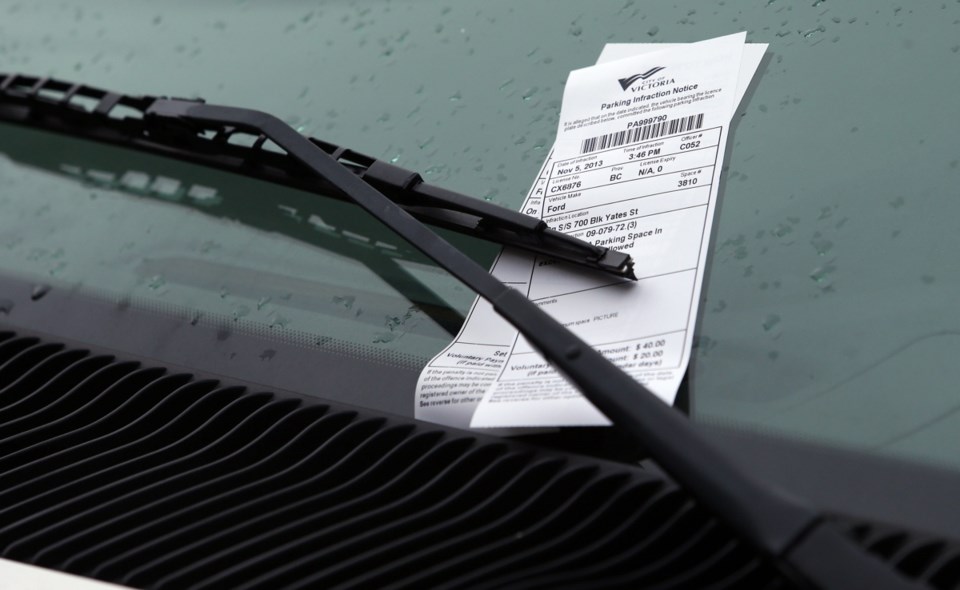Fewer parking tickets were already being issued to Victoria drivers when the city unveiled a program to replace commissionaires with new customer service-oriented “parking ambassadors,” at an estimated cost of $100,000 more per year.
A staff report shows that tickets were declining, warnings were on a slight rise and fewer drivers were asking for reviews of their tickets, when council voted in favour of rolling out the new program, which will replace a long-standing contract with the Corps of Commissionaires with in-house unionized positions.
Fairfield resident Stan Bartlett, who filed a Freedom of Information request for the new program’s business case, said he doesn’t believe the city has taken into account the full costs associated with creating unionized positions.
“The taxpayer should be getting the best deal and service that can be achieved here,” Bartlett said. “For me, one of the big questions is, how accurate are their cost and revenue estimates?”
But Mayor Lisa Helps said the program is about more than just the number of tickets and complaints: It’s about responding to the 1,000-plus residents who participated in a public consultation process last year on parking.
“We heard loudly from the business community and from residents who said, ‘You’ve got to do something about parking enforcement,’ ” Helps said.
Council and staff hope to bring the program in line with a culture of good service across government departments, she said. The parking ambassadors will be trained to give tourists directions, report graffiti and serve other roles intended to improve the city environment.
“When it’s brought in-house, we have way more flexibility,” Helps said. “We’re all here to serve the public; it’s an ethic. And you can’t put an ethic into a contract, but you can certainly weave an ethic through an organization.”
Commissionaires issued 159,656 tickets in 2014, down from 194,200 in 2012, according to a report councillors received March 26.
Commissionaires have also been cancelling more tickets after interacting with drivers: In 2014, 11,209 tickets were cancelled when the driver moved his or her vehicle on request, compared with 3,313 in 2012.
Fewer people have also been requesting reviews of their tickets: The number dropped to 31,960 in 2014, from 37,144 in 2013 and 35,557 in 2012.
The total number of tickets cancelled remains steady, while warnings have increased slightly.
The Corps of Commissionaires proposed to incorporate customer service into their contract, for under $1 million annually. The in-house model will cost about $1.16 million each year, according to the staff report, although the city is expecting cost savings from eliminating redundancies in, for example, ticket cancellation, once parking enforcement moves in-house.
While commissionaires were paid about $14 an hour plus benefits, the new positions are expected to pay about $17 an hour plus benefits.
Coun. Geoff Young, an economist, said he initially had doubts about the new program.
“I certainly like the idea of a contract in terms of making sure the services are provided efficiently and at the lowest possible cost,” Young said.
But he said he is satisfied with staff cost estimates and sees benefits in terms of training opportunities and increased communication between parking enforcers and the city.
While some complaints are reasonable, many are not.
“One of the most frequent complaints we hear, for example, is: ‘I was just having a cup of coffee,’ or ‘I just had to run in and go to the bathroom.’ What the person is really saying is: ‘I want the parking enforcement person to stand by my car for as long as it takes to have a cup of coffee and when I come back, discuss with me whether that was a reasonable amount of time,’ ” Young said.
“I think it’s really tough to enforce parking in a way that is fair, that is consistent and yet that recognizes people’s needs. And I think maybe I’m hoping we can achieve some improvement.”
Fines down, warnings up
• Warnings increased to 10,622 in 2014, from 9,667 in 2013 and 9,930 in 2012.
• The city lost about $1.28 million in uncollected parking fines in 2014 and $1.5 million in 2013.
• The city collected $3.98 million in revenue from traffic violations, parking fines and towing fees in 2014. The net revenue from parking enforcement was $1.44 million, after taking into account the Commissionaire service, contracted services, uncollected fines and other costs. Net revenue was $1.91 million in 2013.
• The city has assumed a two per cent annual increase in expenses relating to parking enforcement. It expects $1.77 million in net revenue for 2015, which will decline to $1.57 million by 2019.
— Sources: City of Victoria staff report, the city’s 2015 draft financial plan



